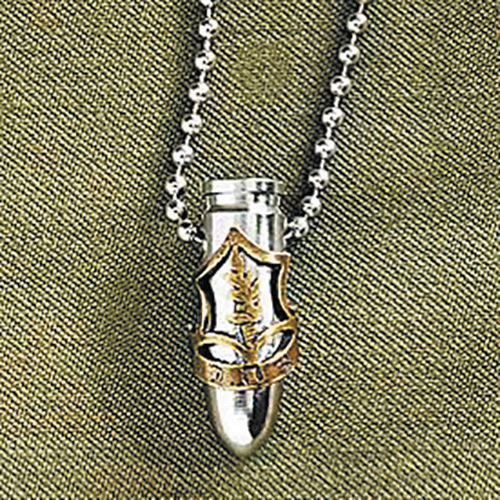
My grandfather is not what you would call an expressive man. Saba Yisrael is a six-foot bear of a guy who isn’t fond of big displays of emotion or long eloquent speeches about how he feels. If given the choice between going to a soccer game and doing just about anything else in the world, he would run to the soccer stadium and watch with intensity.
But before my bar mitzvah, he gave me a gift that means more than words can express. He handed it to me after a weekend I spent visiting him and my Savta Judy in Brooklyn. I had a great time eating my Savta’s homemade Israeli food, playing soccer in the park, and watching soccer on TV with Saba.
As I was packing my suitcase to leave, Saba handed me a necklace. It had a metal link chain with a tarnished bullet at the end of it. He didn’t explain why he was giving it to me or what the significance was. He just placed it in my hands.
I was surprised. Saba always promised us gifts, but rarely delivered. It was always Savta who pulled things out of mysterious plastic bags of assorted colors and said, “Look what I have for you.” But when it came to Saba, his promises were something of a family joke. He had told my cousin Rafi he was buying him a Lexus, which never happened. And for years he promised us he was taking us to San Francisco. Eventually, my parents stopped waiting and went to San Francisco themselves.
But now, Saba had given me something of his own. I stared with wonder at the necklace in my hands. Although I had learned to shoot a gun in camp, I had never held such a large bullet in my hands before.
It wasn’t until several months later that I got to hear about Saba’s own encounter with a bullet. We were at a family gathering and I sat myself down next to him at our dining room table. I expected him to ask me to pass the chicken or the hummus. Instead, he ended up talking to me about his life. He got a faraway look in his eyes and recalled the days when he was a paratrooper in the Israeli army. At that time, he participated in many Special Forces missions behind enemy lines.
In the 1956 War, he was among the paratroopers who were dropped into the Mitla Pass. Sadly, many Israelis died in that war due to the heavy firing on the paratroopers by the Egyptian army. Under the command of Major Rafael Eitan, Saba parachuted under enemy fire. Although the operation was successful, it marked the last time an IDF paratroop battalion jumped into combat, he told me. As he landed, he felt a burning sensation in his leg. He realized he had been shot by enemy snipers.
After he landed, a bomb went off, covering him in the Sinai sand. He was completely buried beneath a mound of several feet of sand. A friend in his unit quickly dug him out while under enemy fire. If not for his friend, Saba would have suffocated. The two men are still in touch to this day.
Before the war, Saba had been a soccer player on Maccabi Petach Tikvah, an Israeli soccer team. But now, the leg that had expertly dribbled, kicked, and blocked the ball was severely injured. The bullet shattered his bone and it took months and several surgeries for him to recover. His dreams of playing professional soccer were destroyed and he had to find a new career. Today, decades later, his injury still pains him, a reminder of his heroism.
After he told me his story, I examined the necklace again and felt I was putting together a puzzle I had been working on for a long time. Suddenly, I saw the necklace in a new way. The bullet on the link chain will always remind me of my grandfather’s story and of his heroism during Israel’s crucial years. I keep it as a reminder of my Saba’s significance to me in my life, and of his courage and sacrifice for Israel.
Sometimes, the most valuable gifts we receive are not the most expensive ones.
Yehudah Fuksbrumer is a junior at TABC. He has previously been published in The Jewish Standard, Chabad.com and, most recently, a Celebration of Poets, a national poetry anthology.
By Yehudah Fuksbrumer











